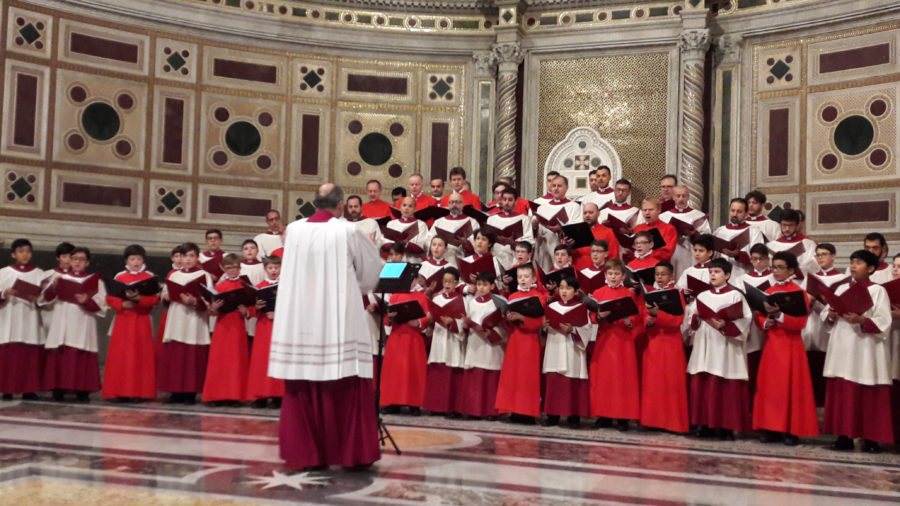1st February 2017 Holy See
Ecumenism in Music

Last week saw the visit of the choir of Westminster Abbey, for a joint concert with the Sistine Chapel Choir. This was a wonderful concert, with the two choirs combining to fill the Basilica of St John Lateran with music from both the Catholic and Anglican traditions: pieces by Giovanni Palestrina showcased the Catholic style, and Westminster Abbey brought a selection of English Church music including pieces from Thomas Tallis, William Byrd, Orlando Gibbons, William Harris and Philip Moore. The sight of the two choirs, intermingled, singing together “Tu es Petrus” by Palestrina, or Charles Parry’s “My Soul” was uplifting.
This was ecumenism at its best. There were no discussions about theology, or arguments about the ordination of women. It called to hearts, rather than heads. And it reflected a salient fact – to much of the world the difference between the different Christian faiths does not matter. If a Church is attacked by a mob somewhere, they do not stop to ask whether the people are Catholic, Anglican, Orthodox or Methodist. If Christians are persecuted for their faith there is often no special treatment for one over another. A Christian is a Christian. Pope Francis has referred to this as “ecumenism of blood” – all suffer together.
That is not to downplay the differences. Some are very important issues which speak to the core of the religion. Over the centuries, many have been persecuted and died because of them. Fortunately nowadays these questions can be debated quietly, using words rather than swords or flames. Joint Commissions are carefully considering these issues, and there has been recent progress to report for example on joint recognition of baptism between Catholic and Orthodox. There is more desire to celebrate what unites, rather than concentrating on what divides.
For Pope Francis and the Holy See, 2016 was a year rich in ecumenism. Highlights included his meeting the Russian Orthodox Patriarch in Havana, visiting Lesbos with the Ecumenical Patriarch and the Greek Orthodox Archbishop of Athens, joint Vespers celebrating the 50thanniversary of the historic meeting of Pope Paul VI and the then Archbishop of Canterbury, Michael Ramsey, and attending the commemoration of 500th anniversary of the Reformation in Sweden. We can expect this movement towards greater practical cooperation to continue. As Martin Luther actually pinned his thesis to the door of Wittenburg Church in 1517, there will no doubt be other occasions this year for ecumenical events.
Rather fittingly, in the week of Christian Unity, the last item of the concert was the two choirs singing together the Palestrina arrangement of the “Credo”, raising their voices together to celebrate God.
